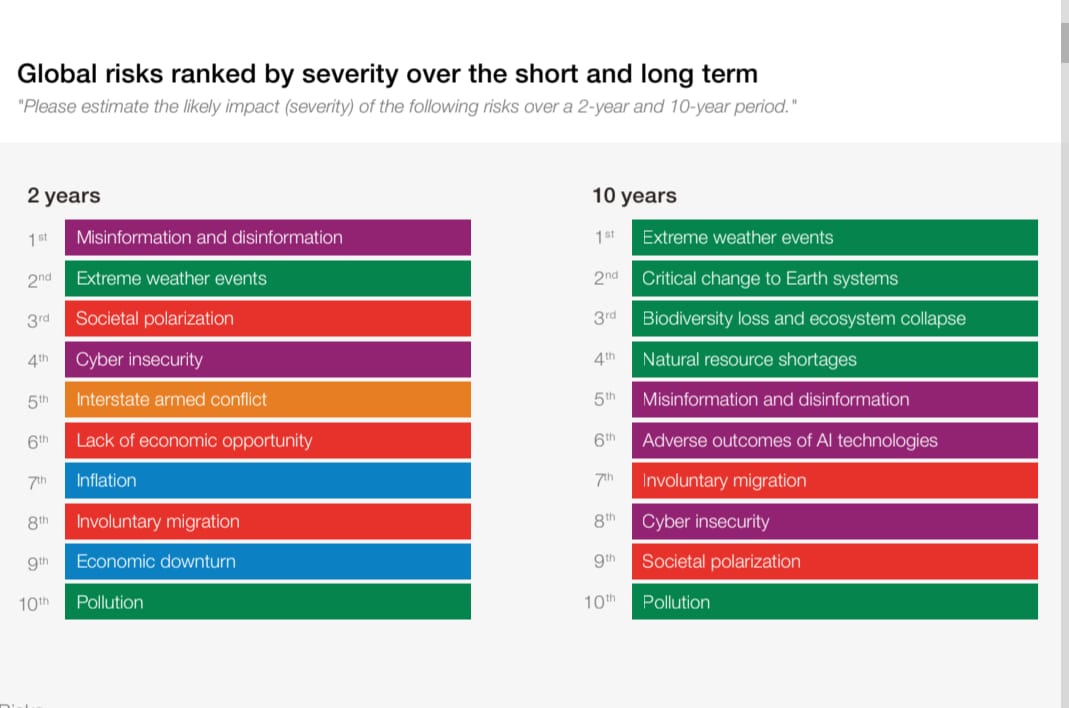
Water Conservation: 7 Simple Ways to Save Water at Home and in Your Business
Water is one of our most precious resources, yet it is often wasted without thought. ...

The Global Risks Report 2024 – issued by the World Economic Forum (WEF) – said that misinformation comes at the top of two-year short term global risk, while climate-related threats made the top four risks of the 10-year long term global risks.
Climate-related risks contribute 5 of the top 10 threats in a 10-year context as the world nears or crosses “climate tipping points”, while the threat from misinformation and disinformation is identified as the most severe short-term threat in the 2024 report.
The risk posed by extreme weather events tops the list as nations remain unprepared for the “triggering of long-term, potentially irreversible and self-perpetuating changes to select planetary systems [which] could be passed at or before 1.5C of global warming, currently anticipated to be reached by the early 2030s”.
Over the next two years, the report states, “foreign and domestic actors alike will leverage misinformation and disinformation to widen societal and political divides”. This risk is enhanced by a large number of elections in the near future, with more than 3 billion people due to head to the polls in 2024 and 2025, including in major economies like the United States, India and the United Kingdom.
The report suggests that the spread of mis- and disinformation around the globe could result in civil unrest, but could also drive government-driven censorship, domestic propaganda and controls on the free flow of information.
The findings are based on the Forum’s Global Risks Perception Survey, which gathers insights from nearly 1,500 global experts from academia, business, government, the international community and civil society.
While the threat of extreme weather is seen as an immediate one, there was disagreement about the urgency of other climate-related risks such as the loss of biodiversity and ecosystem collapse. Concern about these risks was significantly higher among younger respondents to the survey, prompting fears that mitigation could be delayed beyond the point where meaningful action can be taken.
As 2024 starts, results of the Forum’s Global Risks Perception Survey 2023-2024 (GRPS) highlight a predominantly negative outlook for the world over the short term that is expected to worsen over the long term. Surveyed in September 2023, the majority of respondents (54%) anticipate some instability and a moderate risk of global catastrophes, while another 27% expect greater turbulence and 3% expect global catastrophic risks to materialize in the short term. Only 16% expect a stable or calm outlook in the next two years. The outlook is markedly more negative over the 10-year timeframe, with 63% of respondents expecting a stormy or turbulent outlook and less than 10% expecting a calm or stable situation.
GRPS results for 2024, 2026 and 2034 highlight current crises that corrode resilience, as well as new and rapidly evolving sources of risk that will reshape the next decade. For the one-year time frame, respondents were asked to select up to five risks that they feel are most likely to present a material crisis on a global scale in 2024.
After the hottest Northern Hemisphere summer in recorded history in 2023,2 two-thirds of respondents selected Extreme weather (66%) as the top risk faced in 2024. El Niño, or the warming phase of the alternating El Niño-Southern Oscillation (ENSO) cycle, is expected to strengthen and persist until May this year. This could continue to set new records in heat conditions, with extreme heatwaves, drought, wildfires and flooding anticipated.
AI-generated misinformation and disinformation (53%) and Societal and/or political polarization (46%) follow in second and third place. Many countries are still struggling to regain lost years of progress that arose from the COVID-19 pandemic, creating fertile ground for misinformation and disinformation to take hold and polarize communities, societies and countries.
These key findings of the World Economic Forum’s Global Risks Report 2024 reflect these most pressing challenges faced by people in every region of the world.
اترك تعليقا